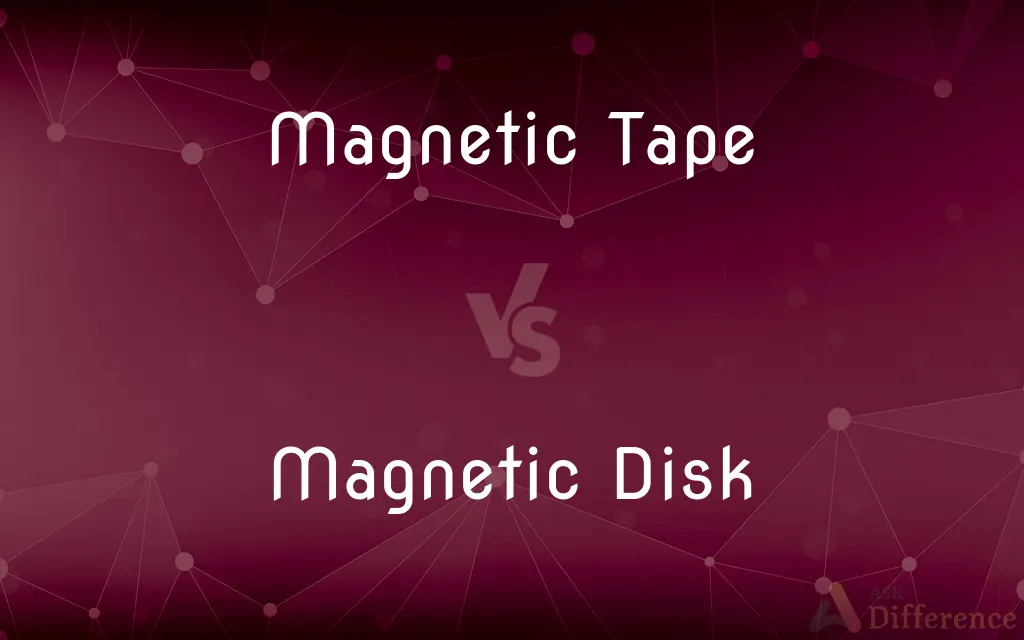Magnetic Tape vs. Magnetic Disk — What's the Difference?
By Tayyaba Rehman — Published on January 13, 2024
Magnetic Tape is a sequential storage medium, ideal for archiving and backups. Magnetic Disk, like hard drives, offers random access storage, suitable for active data use.

Difference Between Magnetic Tape and Magnetic Disk
Table of Contents
ADVERTISEMENT
Key Differences
Magnetic Tape is a type of data storage medium that records data on a magnetizable coating on a strip of plastic film. It is primarily used for archival and backup purposes due to its high capacity and low cost. Magnetic Disks, such as hard disk drives (HDDs), store data magnetically on rotating disks. They are commonly used in computers and servers for everyday data storage and retrieval.
The key advantage of Magnetic Tape is its high storage density and low cost per gigabyte, making it suitable for long-term data storage. However, it has slower access times because it is a sequential access medium – the tape must be wound to the correct position to read or write data. In contrast, Magnetic Disks provide faster, random access to data, allowing for quicker read and write operations, essential for operating systems and applications.
Magnetic Tape systems typically require specialized tape drives to read and write data, which can be slower and less convenient than disk-based systems. On the other hand, Magnetic Disks are integrated into the computer system, allowing for seamless interaction with the computer's operating system and software.
In terms of reliability, Magnetic Tapes are less susceptible to physical shock and have a longer shelf life, often used for disaster recovery. Magnetic Disks, while more susceptible to physical damage, offer more convenience for daily operations, with the ability to quickly access and update files.
Magnetic Tape has seen a decline in everyday use but remains vital for certain applications like offline data storage and archival. Conversely, Magnetic Disks, despite the rise of solid-state drives (SSDs), continue to be widely used due to their balance of cost, capacity, and performance.
ADVERTISEMENT
Comparison Chart
Storage Type
Sequential access
Random access
Primary Use
Long-term archiving and backup
Everyday data storage and retrieval
Access Speed
Slower due to sequential nature
Faster, suitable for active file access
Cost
Lower cost per gigabyte
Higher cost but more convenient
Physical Durability
More durable, longer shelf life
Less durable to shocks
Compare with Definitions
Magnetic Tape
Requires specialized tape drives for access.
Accessing data from magnetic tape requires a compatible tape drive.
Magnetic Disk
Magnetic Disks are integral for daily operations.
We store all our working files on the computer's magnetic disk.
Magnetic Tape
It's a high-capacity, low-cost storage medium.
Magnetic tapes offer an affordable solution for archiving.
Magnetic Disk
Commonly used in computers and servers.
The computer's hard drive is a type of magnetic disk.
Magnetic Tape
Magnetic Tape is used mainly for backups.
Our company archives important records on magnetic tapes.
Magnetic Disk
Offers a balance of cost, capacity, and performance.
Magnetic disks are a cost-effective solution for active data storage.
Magnetic Tape
It's durable and has a long shelf life.
Magnetic tapes can safely store data for decades.
Magnetic Disk
More susceptible to physical damage.
Dropping a laptop can damage its magnetic disk.
Magnetic Tape
Magnetic Tape stores data sequentially on a strip.
We use magnetic tapes for offsite data backups.
Magnetic Disk
Magnetic Disk allows for random access storage.
Our server uses magnetic disks for quick data retrieval.
Common Curiosities
What is magnetic tape used for?
It's mainly used for archival, backup, and long-term data storage.
Can magnetic tape be reused?
Yes, magnetic tapes can be erased and reused multiple times.
How much data can magnetic tape hold?
Modern magnetic tapes can hold up to several terabytes of data.
Are magnetic disks faster than magnetic tapes?
Yes, magnetic disks provide quicker, random access to data compared to the sequential access of tapes.
Is magnetic tape susceptible to data corruption?
It's less prone to corruption but can be affected by magnetic fields and physical deterioration over time.
Is it easy to transfer data from magnetic tape to a computer?
It requires a tape drive and can be slower compared to disk transfers.
What is a magnetic disk?
A magnetic disk, like a hard drive, is used for storing and retrieving data actively.
Why is magnetic tape still used?
Due to its cost-effectiveness and durability for long-term storage.
Are magnetic disks being replaced by SSDs?
SSDs are becoming more popular but magnetic disks are still widely used due to their cost-effectiveness.
Can I use a magnetic disk for backups?
Yes, but they are more suited to active storage rather than long-term archival.
How does temperature affect magnetic tape and disk?
Both can be affected by extreme temperatures but tapes are more durable under various conditions.
What is the lifespan of a magnetic disk?
Typically, magnetic disks have a lifespan of 3-5 years under active use.
How does the cost of magnetic tape compare to magnetic disk?
Magnetic tape generally has a lower cost per gigabyte, making it more economical for large data volumes.
Do modern computers use magnetic disks?
Yes, many use magnetic hard drives, though SSDs are becoming more common.
Can magnetic tape be damaged by magnets?
Yes, strong magnetic fields can erase or corrupt data on tapes.
Share Your Discovery

Previous Comparison
Tcpdump vs. Wireshark
Next Comparison
Adversarial Relationship vs. Partnership RelationshipAuthor Spotlight
Written by
Tayyaba RehmanTayyaba Rehman is a distinguished writer, currently serving as a primary contributor to askdifference.com. As a researcher in semantics and etymology, Tayyaba's passion for the complexity of languages and their distinctions has found a perfect home on the platform. Tayyaba delves into the intricacies of language, distinguishing between commonly confused words and phrases, thereby providing clarity for readers worldwide.














































